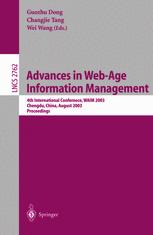

Most ebook files are in PDF format, so you can easily read them using various software such as Foxit Reader or directly on the Google Chrome browser.
Some ebook files are released by publishers in other formats such as .awz, .mobi, .epub, .fb2, etc. You may need to install specific software to read these formats on mobile/PC, such as Calibre.
Please read the tutorial at this link: https://ebookbell.com/faq
We offer FREE conversion to the popular formats you request; however, this may take some time. Therefore, right after payment, please email us, and we will try to provide the service as quickly as possible.
For some exceptional file formats or broken links (if any), please refrain from opening any disputes. Instead, email us first, and we will try to assist within a maximum of 6 hours.
EbookBell Team

4.0
46 reviewsWith advances in the Internet and technologies around the World-Wide Web, research on design, implementation, and management of Internet- and W- based information systems has become increasingly important. As more and more information of diverse type becomes available on the Internet and Web, query and retrieval as well as the management of information over the Internet become more complex and extremely di?cult. Novel approaches to develop and manage Internet and Web information systems are in high demand. Following the successful conferences in 2000, 2001 and 2002, WAIM 2003 continued to provide a forum for researchers, professionals, and industrial practitioners from around the world to share their rapidly evolving knowledge and to report on new advances in Web-based information systems. WAIM 2003 received an overwhelming 258 submissions from Australia, Canada, China, Denmark, France, Germany, Greece, Hong Kong, Japan, South Korea, Pakistan, Singapore, Sweden, Switzerland, Taiwan, Thailand, UK, USA, and Vietnam. Through careful review by the program committee, 30 papers were selected as regular papers, and 16 papers as short papers. As indicated by these numbers, WAIM 2003 is extremely selective: 11 and 17 areas, respectively, including text management, data mining, information ?ltering, moving objects, views, bioinformatics, Web and XML, multimedia, peer-to-peer systems, service networks, time-series streams, and ontologies. Two invited talks by Sushil Ja- dia (George Mason University, USA) and Beng Chin Ooi (National University of Singapore) were on access control models and peer-to-peer systems.